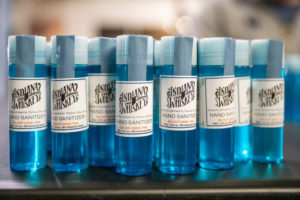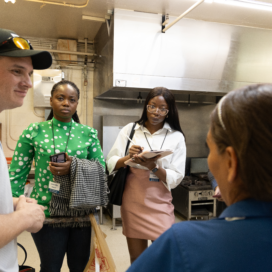Good spirits: ND MBA grad shifts distillery production to hand sanitizer
Published: April 8, 2020 / Author: Melissa Jackson
“Do not drink this.”

Indiana Whiskey Company president Charles Florance (MBA ’13) (Photo by Barbara Johnston/University of Notre Dame)
Not quite the labeling you’d expect to find on something bottled by a distillery. But starting in late March, it became part of business as usual for Indiana Whiskey Company. That’s when the South Bend-based distillery owned by Charles Florance (MBA ’13) shifted from producing its award-winning small-batch whiskeys to bottling an all but impossible-to-find commodity: hand sanitizer.
Barely a week after federal regulators gave distilleries the green light to begin production in the wake of the shortage caused by coronavirus, the first bottles of Indiana Whiskey hand sanitizer rolled out for distribution to essential workers in the region.
Florance is quick to give credit to three other local firms, The Lebermuth Company, Maverick Packaging and Martin’s Supermarkets, which stepped in to help secure supplies and assist with distribution.
“If it would have been us alone, we couldn’t have done it,” he says.

Indiana Whiskey Company vice president Matthew Logsdon (MBA ’20) (Photo by Barbara Johnston/University of Notre Dame)
Volunteers were also key in ramping up early production, says Indiana Whiskey’s vice president Matthew Logsdon, a 2020 Notre Dame MBA candidate and medical student at Indiana University School of Medicine. Classmates from his MBA program at Mendoza College of Business and from IU, along with some Notre Dame theology students, have already helped bottle nearly 30,000 containers of hand sanitizer.
Logsdon says the company had to pause distilling the company’s signature whiskeys in order to begin hand sanitizer production.
“I think what really pushed us over the edge on this was the need,” he says. “We were receiving calls from hospitals, first responders, essential businesses and seeing outrageous prices in the market.”
He knew their operation could produce the product for a lower, fairer price, and they decided to offer a discount to first responders and smaller hospital groups. He and Florance are working on a business plan that would allow them to scale up hand sanitizer production and also return to distilling the company’s signature whiskeys. They expect the plan will involve hiring additional staff.
Florance is glad for an opportunity to contribute to his community.
“I feel like I’m just paying back everything that people in the Michiana community have invested in me over the years,” he says. “Starting with my time at Notre Dame and throughout my time as a business owner, there’s still a balance due.”





